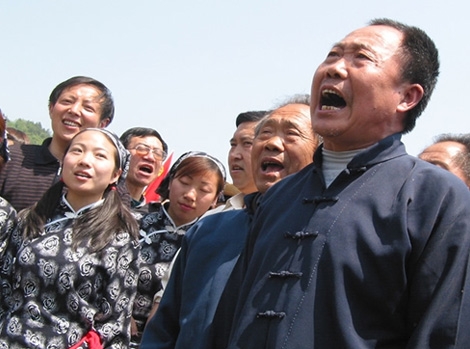
Ziyang folk songs are the general name of folk songs in Ziyang County, Shaanxi Province, and the most typical ones among folk songs in south Shaanxi Province. They have vivid expressions and images, beautiful and appealing melodies, distinctive artistic features and local styles. They are the popular artistic treasure of Ziyang people that were created from centuries of labor.
Ziyang is located at the center of South Shaanxi Province and got its name after Zhang Boduan, the Ziyang Holy Man and the founder of South Sect of Taoism. 25 songs in "Southern Zhou" and "Southern Zhao" in the Book of Songs, the earliest collection of poems in ancient China, were popular in the upper reaches of Hanshui River which includes Ziyang. Ziyang folk songs got mature gradually along with the formation and development of many folk customs during the transition of dynasties and reached the heyday during the Ming and Qing Dynasties.
Ziyang folk songs are divided into a dozen of melodies, including "mountain folk songs", "canzonet", "songs of customs", "flower drum Bacha", "work songs and filial songs" etc as well as "new folk songs". Their musical styles are mostly "lyric", "narrative" and "dance-like", suitable to dance movements, express plots and complicated feelings of characters.
Work songs are the foundation of Ziyang folk songs, while boatman work songs are the core and hold an important position among folk songs in Ziyang. They are rough and wild, having sophisticated and changing keys and rhythms as well as dense life atmosphere. Mountain songs refer to various rustic songs excluding work songs and can best represent features of songs in mountain areas. They are mostly improvised during the work. People are moved by what they see and sing what they have just composed. The contents are mostly about love. Like mountain songs, the range of canzonet is extensive; lyrics relatively fixed; the style tender and smooth; the rhythm elegant and appealing; the melody stable and fine; the volume range narrow; and it has strong narrative features and personal feelings. Custom songs are a popular type of folk oral arts and are composed impromptu. People sing what they see and what comes into their thoughts. They reflect the customs of Ziyang people and are sang by folks in rituals of weddings and funerals in Ziyang. New folk songs are the product of new era and life. They are composed in Ziyang after liberation, with distinct features of modern times and dense political atmosphere.
Ziyang people are mostly descendants of migrants from Hunan, Anhui, Jiangxi, Henan, Fujian and Guangdong in the late Ming and early Qing Dynasties. Ziyang folk songs have apparent imprints of South China. Most of them were originated directly from the ballad scripts in South China, such as "Fustic shoulder pole", "Ten Embroideries", "Collecting Tea", and so on.
There is a folk saying that "Mountain songs are no fake and plays no real". Take "Road Song" as an example. "Road Song" has rhymes, but no melodies, and is a responsory doggerel. People sing what they come across for adding fun, or encouraging the answer.